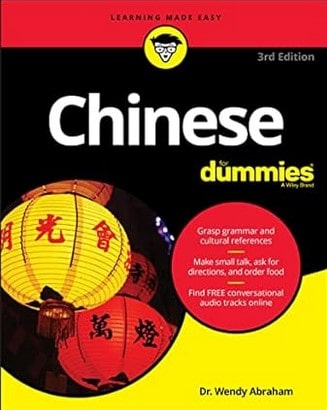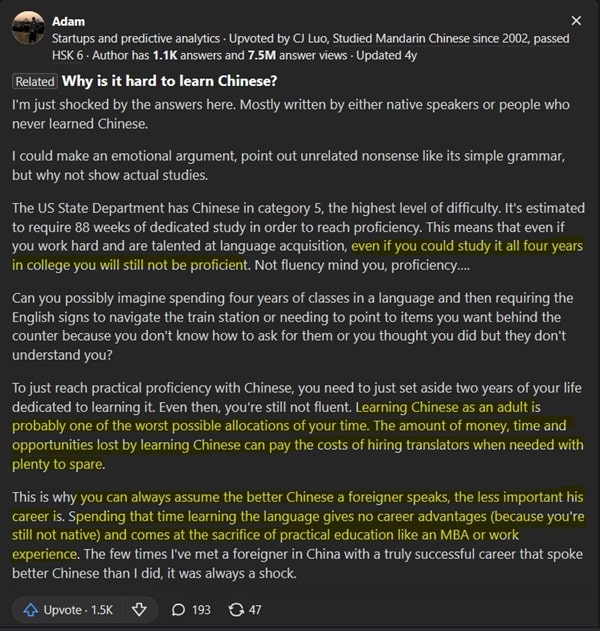In this edition: Do Chinese care about learning English, why has the Chinese divorce rate gone up so much, a day in Suzhou, why it’s not useful to study grammar rules, a flat tire in Tibet, strict Chinese parenting, more Chinese learning advice, Chinese insults and a trip to Nepal.
Do the Chinese care about learning English anymore?
Do Chinese still feel the necessity of studying English or has become mastering the world’s lingua franca become less important? If I try to summarize the answers in this video, for most Chinese people English isn’t that relevant to their career or private life. They might even be more interested in Korean or Japanese, as these languages are closer to home. I wonder if this means that China is becoming more introverted?
Difficulty level: HSK 5
ChinesePinyinEnglish Translation给自己打零分gěi zìjǐ dǎ líng fēnGive yourself a score of zero (self-deprecating)我觉得学习一门外语非常重要,但是不一定是英语wǒ juédé xuéxí yì mén wàiyǔ fēicháng zhòngyào, dànshì bù yídìng shì YīngyǔI think learning a foreign language is very important, but it doesn’t have to be English不能把自己封闭起来吧bù néng bǎ zìjǐ fēngbì qǐlái baYou can’t just shut yourself off, right?我觉得语言是一个文化的载体wǒ juédé yǔyán shì yí gè wénhuà de zàitǐI think language is a carrier of culture还是要往外走háishì yào wǎng wài zǒuStill need to go out into the world学习英文的必要性降低了xuéxí Yīngwén de bìyàoxìng jiàngdī leThe necessity of learning English has decreased
Why are so many Chinese getting divorced?
In a period of just 40 years, China’s divorce rate (离婚率) has gone up from 5 to 50 percent. In this Mandarin Corner video, Eileen tries to find out why so many marriages don’t work out. Here are some of the main reasons that people mention in the street interview:
In the past, financial dependence kept many couples together. Now, women have careers and financial freedom, making them less likely to tolerate unhappy marriages.
Today, younger generations prioritize personal happiness over societal expectations.
Life in big cities is fast-paced, stressful, and expensive. Work pressure and long hours strain relationships, leading to divorce.
The legal process for divorce has become easier, making it more accessible. Earlier, people stayed married simply because it was too hard to get a divorce.
Exposure to different lifestyles and relationships online can create dissatisfaction. Infidelity is also easier with dating apps and social media.
Many young people raised as only children lack experience in conflict resolution and compromise. This makes them less likely to endure difficulties in marriage.
In other words, people don’t just marry for ‘survival’, but look for emotional fulfillment, romance and compatibility. All these factors lead to more breakups when expectations aren’t met. I personally don’t think it’s just China – I see the same trend here in Germany where second and even third marriages are quite common.
Difficulty level: HSK 5
ChinesePinyinEnglish Translation离婚率líhūn lǜDivorce rate女的做好了一定程度的心理准备nǚ de zuò hǎo le yídìng chéngdù de xīnlǐ zhǔnbèiWomen have mentally prepared to a certain extent女性在觉醒啊nǚxìng zài juéxǐng aWomen are awakening离婚对我们那代人是一件很羞耻的事情líhūn duì wǒmen nà dài rén shì yí jiàn hěn xiūchǐ de shìqíngDivorce was a shameful thing for our generation男的没负到男人的责任nán de méi fù dào nánrén de zérènMen didn’t fulfill their responsibilities as men大家都在追求真爱dàjiā dōu zài zhuīqiú zhēn’àiEveryone is in pursuit of true love没办法去接纳彼此的不同méi bànfǎ qù jiēnà bǐcǐ de bùtóngUnable to accept each other’s differences从一而终cóng yī ér zhōngTo remain faithful to one person for life
A day out in Suzhou
Here’s a little vlog from a Chinese teacher based in Suzhou where she shows us around, taking us to the subway, a local supermarket, bookstore and café.
Difficulty level: HSK 4
ChinesePinyinEnglish Translation购票机gòupiàojīTicket vending machine地铁卡dìtiě kǎSubway card线路xiànlùRoute, line (e.g., subway/bus route)闸机zhájīTurnstile站台zhàntáiPlatform (train/subway)走楼梯zǒu lóutīTake the stairs走手扶梯zǒu shǒufútīTake the escalator购物篮gòuwù lánShopping basket
Native speakers don’t study grammar!
Studying grammar rules is a waste of time? Well, here’s some learning advice from the YouTube Channel 每日中文课, arguing that trying to actively memorize grammar patterns doesn’t lead to fluency, on the contrary, it mostly leads to frustration, because of not being able to reproduce the ‘correct patterns’. She makes the point that grammar rules get acquired along the way – much like native speakers do without conscious effort. Do you agree?
Difficulty level: HSK 5
ChinesePinyinEnglish Translation我花了大量的时间学习语法规则wǒ huā le dàliàng de shíjiān xuéxí yǔfǎ guīzéI spent a lot of time learning grammar rules我们非常依赖规则wǒmen fēicháng yīlài guīzéWe rely heavily on rules反反复复fǎnfǎn fùfùRepeatedly, over and over密集的连接点mìjí de liánjiē diǎnDense connection points灵活línghuóFlexible获得流利的能力huòdé liúlì de nénglìGain fluency没有办法很好的表达méiyǒu bànfǎ hěn hǎo de biǎodáUnable to express well
I drove to Tibet alone and had a flat tire for the first time
Some more educational content here: this video illustrates why it’s always a good thing to carry a spare tire, just in case one of your tires decides to explode in the Tibetan mountains. I’m not sure why she was driving a truck in Tibet, but I’ll make sure to return to this YouTube channel for more inspiring videos like this, as I enjoyed the way she just keeps on laughing in a messy situation.
Difficulty level: HSK 4
ChinesePinyinEnglish Translation这是正常现象吗zhè shì zhèngcháng xiànxiàng ma?Is this normal?开到半路我车居然爆胎了kāi dào bànlù wǒ chē jūrán bàotāi leMy car actually got a flat tire halfway!见了鬼了jiàn le guǐ leUnbelievable! / What the heck!这胎不全毁了吗zhè tāi bù quán huǐ le ma?Isn’t this tire completely ruined?我没爆过胎wǒ méi bào guò tāiI’ve never had a flat tire before备胎bèitāiSpare tire (also slang for a backup plan/person)
Why are Chinese parents so strict with their children?
Chinese teacher Laocan gives his take on why Chinese parents are so strict with their children. Characteristic of the Chinese situation is that many people share very few resources with each other. This leads to immense mutual competition. In addition, there is the Confucian attitude that propagates hard work without complaining, which in itself is not wrong. The question is of course what is most beneficial for children?
My impression was always that Chinese parents ‘encourage each other’ to go the extra mile, nobody wants to lag behind, so the motto is to arrange as many extra lessons (课外补习班) as possible for your child and to ensure that it performs optimally. After all, you do not want it to have to assemble mobile phones in a factory or deliver food on a scooter later on. I understand from Laocan that the Chinese government has made an attempt to combat the greatest excesses in the field of extracurricular education, although this has only been partly successful. The fight for a better future continues of course and it takes time for attitudes to change.
Difficulty level: HSK 5
ChinesePinyinEnglish Translation为什么中国家长对孩子这么严格啊wèi shénme Zhōngguó jiāzhǎng duì háizi zhème yángé a?Why are Chinese parents so strict with their kids?很多人都有所耳闻hěn duō rén dōu yǒu suǒ ěrwénMany people have heard about it就脱离了中国这个环境仍旧这么严格jiù tuōlí le Zhōngguó zhège huánjìng réngjiù zhème yángéEven outside of China, they are still this strict你可能在这个世界上就没法生存nǐ kěnéng zài zhège shìjiè shàng jiù méifǎ shēngcúnYou might not be able to survive in this world儒家文化本来就讲究是勤奋刻苦啊Rújiā wénhuà běnlái jiù jiǎngjiū shì qínfèn kèkǔ aConfucian culture emphasizes diligence and hard work东亚是一个特别特别“卷”的社会Dōngyà shì yí gè tèbié tèbié “juǎn” de shèhuìEast Asia is a very, very competitive society这应该是刻在基因里的zhè yīnggāi shì kè zài jīyīn lǐ deThis is probably engraved in the genes流在血液里的liú zài xuèyè lǐ deFlowing in the blood中国政府终于出台了Zhōngguó zhèngfǔ zhōngyú chūtái leThe Chinese government finally introduced (a policy)因为说实话当时教培行业啊给中国的父母啊贩卖焦虑啊yīnwèi shuō shíhuà dāngshí jiàopéi hángyè a gěi Zhōngguó de fùmǔ a fànmài jiāolǜ aBecause, to be honest, the tutoring industry was selling anxiety to Chinese parents让孩子去上这个课外补习班啊ràng háizi qù shàng zhège kèwài bǔxíbān aMaking kids attend extracurricular tutoring classes相对而言呢xiāngduì ér yán neRelatively speaking压力减缓了一些yālì jiǎnhuǎn le yìxiēThe pressure has eased somewhat
Will Hart: This trick will skyrocket your Chinese speaking
ChinesePinyinEnglish Translation作为一个过来人zuòwéi yí gè guòláirénAs someone who has been through it联系造句liánxì zàojùMake sentences using (a word/concept)话说回来huà shuō huíláiSpeaking of which, on the other hand关键时刻guānjiàn shíkèCritical moment告个别gào gè biéSay goodbye创造力chuàngzàolìCreativity想象力xiǎngxiànglìImagination脱口而出tuōkǒu ér chūBlurt out, speak without thinking提高效率tígāo xiàolǜImprove efficiency
Daily Chinese expression 282「饭桶 | 吃干饭」
ChinesePinyinEnglish Translation饭桶fàntǒngRice bucket; (metaphorically) a useless person水桶shuǐtǒngWater bucket笔筒bǐtǒngPen holder饭盒fànhéLunch box食量shíliàngAppetite, food intake这个比喻太形象了zhège bǐyù tài xíngxiàng leThis metaphor is too vivid比喻成饭桶bǐyù chéng fàntǒngCompared/metaphorically called a “rice bucket”不折不扣的贬义词bù zhé bù kòu de biǎnyìcíAn absolute derogatory term做贡献zuò gòngxiànMake a contribution吃干饭chī gānfàn(Metaphorically) Useless; just eating without contributing
The 23rd country in our global travels, one of the poorest countries in Asia, the mysterious Nepal!
ChinesePinyinEnglish Translation又开始背包环球了yòu kāishǐ bèibāo huánqiú leBackpacking around the world again你这口气有点不太情愿啊nǐ zhè kǒuqì yǒudiǎn bù tài qíngyuàn aYou sound a bit reluctant一百钱你还想要什么电梯呢yì bǎi qián nǐ hái xiǎng yào shénme diàntī neWhat kind of elevator do you expect for 100 bucks?主要是我们感觉这次还没带多少东西zhǔyào shì wǒmen gǎnjué zhè cì hái méi dài duōshǎo dōngxiMainly, we feel like we didn’t bring much this time还要预定明天早上去机场送机的hái yào yùdìng míngtiān zǎoshang qù jīchǎng sòng jī deStill need to book a ride to the airport tomorrow morning这个落地比较猛啊zhège luòdì bǐjiào měng aThis landing was pretty rough电话卡办好了diànhuàkǎ bàn hǎo leSIM card is set up没有那么落后méiyǒu nàme luòhòuNot that backward这边的人就是没诚信zhè biān de rén jiù shì méi chéngxìnPeople here just aren’t trustworthy
I hope you enjoyed this early spring edition. I’ll be back with more Chinese vocabulary notes soon!
Affiliate links
Disclosure: These are affiliate links. They help me to support this blog, meaning, at no additional cost to you, I will earn a small commission if you click through and make a purchase.


